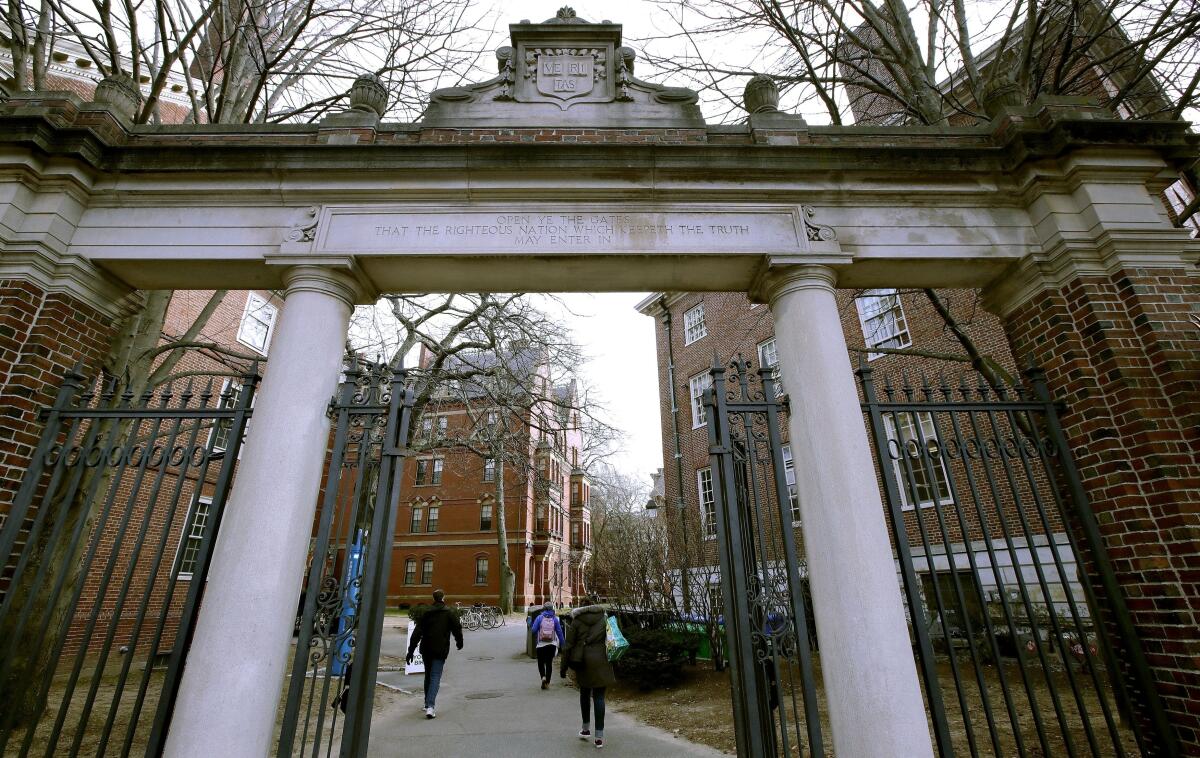Apodaca: Some advice for next year’s high school graduating class

- Share via
Right about now, college-bound high school seniors across the land have made their final decisions about where they’ll attend in the fall.
Congratulations are due, celebrations will ensue and plans for campus life will commence. It’s an exciting time, the culmination of years of effort and angst marking a segue to an important new chapter in young people’s lives.
The college admissions ordeal now begins in earnest for next year’s graduating class. For them, their parents and all future generations, I have a piece of advice.
Don’t apply to Harvard.
Just kidding. Sort of.
By now most of us know the stories, exhaustively reported in recent years, that have revealed what we all felt in our bones was true: The college admissions system is unfair, elitist and occasionally even corrupt. In the best of circumstances, it is also confusing, misleading and riddled with assertions based on flimsy representations of reality.
The most outrageous of these stories is the college admissions scandal known as Operation Varsity Blues. Some local parents were caught participating in this illegal scheme, which involved finagling spots for kids at coveted universities through such brazen means as paying proxies to take standardized tests, faking sports records and outright bribery.
The scandal was only the most extreme example of a process gone terribly awry. In the past few decades, the college admissions game has devolved into a ruthless contest driven by a win-at-whatever-cost mentality, one that drives students and their parents to bouts of anxiety and frustration.
Attempts to ban books from both sides of the political divide have increased with the help of social media, writes Daily Pilot columnist Patrice Apodaca. But the bans can have the opposite effect of their intent.
What is increasingly coming to light is the role that universities themselves play in fostering this unhealthy environment. They, too, have been poisoned by competitive pressures pushing them to market their wares with all the scruples of a used car lot. Shiny paint is a distraction from what lies under the hood.
So I offer an unlikely antidote. Stop applying to Harvard.
Apologies Harvard. I don’t mean to pick on you. That is, I don’t mean to pick on you exclusively.
I use “Harvard” as a stand-in for all the elite institutions — the Ivies, Stanford, et al — that reside in the lofty region at the top of college rankings, as well as those schools judged to be just below them, striving to climb the ladder of academic prestige.
We believe these schools are the best because we are told they are the best. And we are a nation obsessed with lists, ratings and rankings, whether it’s NFL draft picks or “the best” cheese graters on consumer websites.
But what is “best”? Who decides and how?
When it comes to higher ed, we rely on those stupendously stupid college rankings — the most prominent of which is the closely watched list produced by U.S. News & World Report — which are the source of undue influence over academia.
These rankings might have the veneer of statistical objectivity, but that look under the hood would reveal that they are largely based on subjective and highly questionable judgments using data that is largely self-reported by the institutions being ranked.
What’s more — and this shouldn’t come as a surprise — many universities have been credibly accused of submitting false or heavily manipulated data in transparent efforts to boost their rankings. USC, for instance, recently acknowledged that its education school had a “history of inaccuracies” in data reported for college rankings.
Even if the data is accurate, the decisions about which features are factored into the rankings, which are left out, and how much weight afforded each category are hard to fathom. For instance, the biggest factor in the U.S. News rankings is the amorphous “academic reputation” ascribed to a university by other college administrators.
Protesters convened at the campus’ Aldrich Hall Tuesday, demanding better wages and workplace conditions as talks have stalled between UC officials and the unions representing the employed students.
You wouldn’t be wrong to conclude that the whole ranking business is largely puffery and nonsense.
Yet year after year, students and their parents continue to get taken in by the gleaming allure of prestige universities. They are hardly to blame; after all, a Harvard pedigree is probably the surest launching pad for future success. Anyone accepted into that club will be steps ahead of the competition, and the luster will last a lifetime.
So, yes, I realize my suggestion to snub the snotty schools atop the rankings seems crazy.
But if the warped system of college admissions is ever going to undergo substantive change, perhaps it might happen because those who feel as if they have the least power — the students — decide they aren’t going to play the game anymore. There are lots of great schools out there with much to offer bright, hardworking kids who are more interested in learning and in newer, more imaginative views of academia than they are in fusty notions of status.
Any hint of a downturn in applications to high-ranking schools might begin to — “Game of Thrones” reference coming — break the wheel.
The change might already be starting. Consider that more than three-fourths of colleges and universities no longer require SAT or ACT tests, which have been shown to favor affluent students, and which have figured prominently in rankings.
Legacy preferences might also be on the way out. Some private schools have stopped giving the children of alumni an admissions edge, and a bill pending in Congress would outlaw the practice altogether. Chalk up another move against elitism.
Don’t apply to Harvard? It’s a nutty thought. But sometimes nutty ideas are just what we need.
All the latest on Orange County from Orange County.
Get our free TimesOC newsletter.
You may occasionally receive promotional content from the Daily Pilot.






